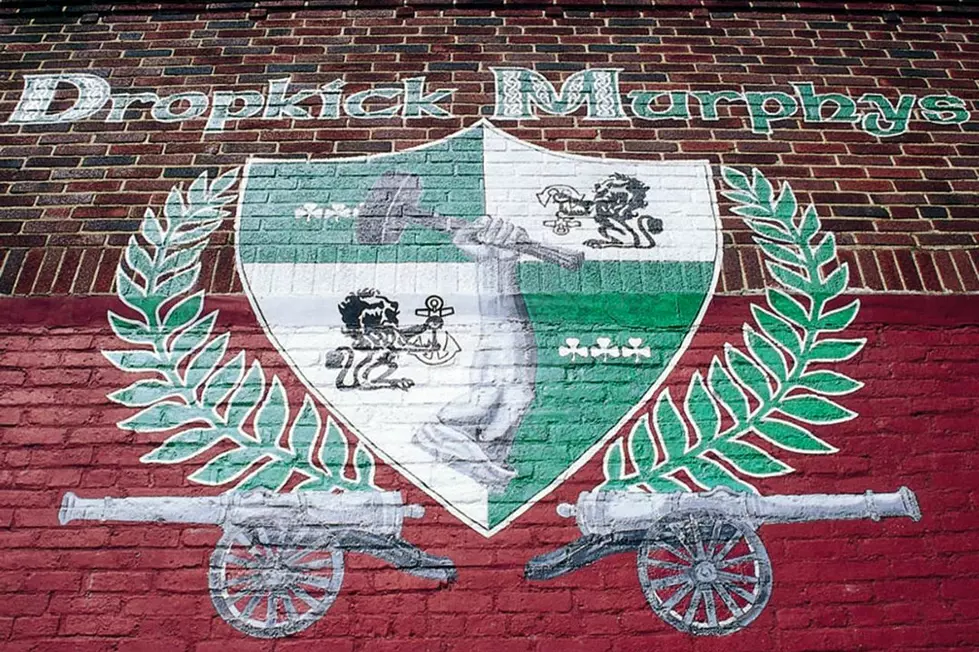30 Years Ago: The Pogues Make Their Masterpiece With ‘If I Should Fall From Grace With God’
It’s fitting that folk-punkers the Pogues reference God’s grace in the title of their masterpiece. Between label difficulties, lineup changes, creative struggles and the persistent curse/blessing that comes with having Shane MacGowan as a frontman, it seems that the band was only able to persevere by the grace of God.
The Irish-English group had followed their 1984 debut LP by releasing another album 10 months later, but an interval of two and a half years occurred before the unveiling of the Pogues’ third studio effort. Initially, the delay was a choice. Uninterested in capitalizing on the buzz of the band’s Elvis Costello-produced Rum Sodomy & the Lash (and, perhaps, creatively spent for the moment), MacGowan and pals instead opted to record a four-song EP in early 1986. The process exposed fissures in the band, as MacGowan and returning producer Costello feuded over creative decisions while bassist Cait O’Riordan and Costello fell deeper in love. O’Riordan subsequently split from the Pogues and married Elvis.
Deeper into 1986, when the band felt ready to begin making a new LP, they couldn’t. Their U.K. label, the legendary punk/new wave indie Stiff, was undergoing financial difficulties that required extensive negotiations on behalf of the Pogues to be released from their record contract and sign with another label. They killed time by recording with famous Irish folkies the Dubliners and becoming part of film director Alex Cox’s Straight to Hell.
As 1987 began, the Pogues’ business entanglements gave way, allowing the group (now signed to Warner in the U.K. and Europe) to begin their third LP. They bolstered their ranks before doing so, replacing O’Riordan with Daryl Hunt and adding multi-instrumentalist Terry Woods and guitarist Phil Chevron (because MacGowan wanted to focus more on singing than strumming).
The new lads didn’t wait to make significant contributions, with Chevron and Woods both writing tunes for the forthcoming album – although MacGowan and banjo/saxophone player Jem Finer remained the primary writers. Yet Woods and Chevron -- both of whom were Irish-born, in contrast to the predominantly English Pogues -- enhanced the band’s connections to the Emerald Isle. Woods penned “Streets of Sorrow” about Irish revolutionary Michael Collins, while Chevron created the elegiac “Thousands Are Sailing” about the often deadly journey that the Irish risked to begin a new life in the U.S.
That wasn’t the only song on If I Should Fall From Grace With God (named for its rollicking leadoff track) that bridged Ireland and America. MacGowan and Finer’s “Fairytale of New York” had been at least two years in the making by the time it was recorded for the album (having already been attempted and discarded with Costello in the producer’s chair and his future wife as MacGowan’s duet partner). The song eventually combined an Ennio Morricone-inspired prelude with a drunken Irish hootenanny and the beautiful/terrible memories of an Irish-American love affair.
It came to be when their manager, Frank Murray, wanted the Pogues to make a Christmas hit single. After rejecting the idea of them covering the Band's "Christmas Must Be Tonight," Murray suggested that MacGowan write his own. Released as the advance single from If I Should Fall… in November 1987, "Fairytale of New York" went to No. 1 on the Irish chart and No. 2 in Britain. The final version featured Kirsty MacColl singing alongside MacGowan, an arrangement secured via the album’s producer (and MacColl’s husband) Steve Lillywhite.
“It was the perfect time,” MacGowan told the Telegraph in 2012, “and the perfect female singer.”
Lillywhite, most famous for his work with U2 and the Psychedelic Furs, ensured a crisp sound for the Pogues. He enhanced the group’s rock ’n’ roll fury without deadening their more delicate folk-inspired finery.
“I think it was as exciting for him as it was for us because he’d never worked with a band live in the studio,” Finer told NME.
The excitement also came in the form of the Pogues’ most diverse array of material, not only including tunes from the new members, but also from new influences, such as Middle Eastern sounds (“Turkish Song of the Damned”) and the group’s time spent filming Straight to Hell in Spain (“Fiesta,” which references Costello and O’Riordan). If you were going to combine Irish folk, punk and rock, why not add a few more flavors?
Coming on the heels of the Pogues’ Christmas success with “Fairytale of New York” (the biggest hit the Pogues would ever score), If I Should Fall From Grace With God was released on Jan. 18, 1988. With hit Irish and U.K. singles in the form of the title track and “Fiesta,” it became the band’s highest-charting LP in most of Europe (No. 3 in Britain) and their first to land on the American chart (No. 88 on Billboard). It remains the band’s most successful release, and is considered by fans, critics and band members to be the apex of the Pogues.
“It had an expansion of influences into different styles,” Finer reflected in Kiss My Arse: The Story of the Pogues. “Everything came together, and it was very focused. That really the creative peak for me, in terms of the whole band being on a wavelength.”
More From Diffuser.fm









